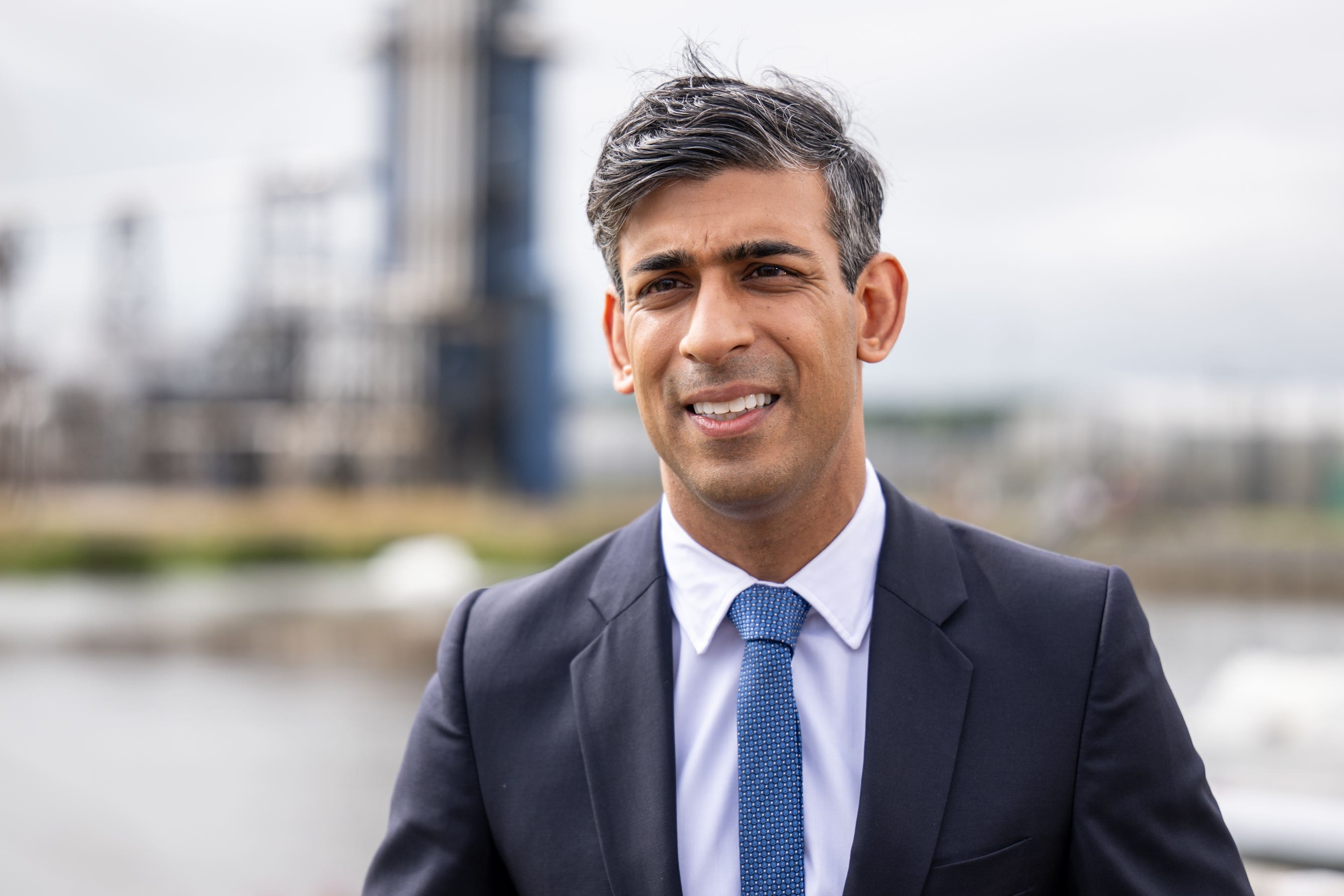Sunak: UK should ‘max out’ developments in North Sea oil and gas
The Prime Minister said the move was best for energy security, the UK economy and the environment.

Your support helps us to tell the story
From reproductive rights to climate change to Big Tech, The Independent is on the ground when the story is developing. Whether it's investigating the financials of Elon Musk's pro-Trump PAC or producing our latest documentary, 'The A Word', which shines a light on the American women fighting for reproductive rights, we know how important it is to parse out the facts from the messaging.
At such a critical moment in US history, we need reporters on the ground. Your donation allows us to keep sending journalists to speak to both sides of the story.
The Independent is trusted by Americans across the entire political spectrum. And unlike many other quality news outlets, we choose not to lock Americans out of our reporting and analysis with paywalls. We believe quality journalism should be available to everyone, paid for by those who can afford it.
Your support makes all the difference.Rishi Sunak has insisted he wants to “max out” developments in the North Sea – as he claimed Labour’s refusal to support new oil and gas fields would be “bad for the British economy”.
The Prime Minister spoke out as he travelled to Scotland to announce Government support for future oil and gas licensing rounds.
And while he refused to say if the controversial Rosebank field to the west of Shetland – the development of which is fiercely opposed by environmental campaigners including Greta Thunberg – would get the green light, his remarks hinted that it could.
Asked about the Rosebank field during a visit to Aberdeenshire on Monday, Mr Sunak stressed that “individual licensing decisions are made through a regulatory process”.
My view is we should max out the opportunities that we have in the North Sea
But he added: “My view is we should max out the opportunities that we have in the North Sea because that’s good for our energy security, it’s good for jobs – particularly here in Scotland – but it’s also good for the climate, because the alternative is shipping energy here from halfway around the world with three or four times the carbon emissions.
“So, any which way you look at it, the right thing to do is to invest and to back our North Sea and that’s what we’re doing.”
With Labour having said it would not give new fields the go ahead if Sir Keir Starmer wins the next general election, Mr Sunak insisted his rival’s policy was “bad for our energy security”.
Continuing his criticism of Labour, the Tory insisted the refusal to support new developments in the North Sea was “bad for the British economy and, in particular, Scottish jobs” and was also “bad for the environment as well”.
Labour’s policy would make the UK “more reliant on energy that comes from abroad” the Prime Minister said.
Mr Sunak said: “It’s bad for the economy and jobs – 200,000 jobs are supported by this industry, many of those here in Scotland – they would be putting people out of work.
“And, thirdly, it’s bad for the environment because if you look at the research that’s been published today – LNG (liquefied natural gas) for example, that comes here from somewhere else, typically has carbon emissions that are three, if not four times, higher than the energy that we can get from here at home.
“So, any which way you look at it, I don’t think that’s the right policy. What we’re doing is right for the country.”
Regulators at the North Sea Transition Authority (NSTA) are currently running the 33rd round of offshore oil and gas licensing, with more than 100 licences in total expected to be awarded from this autumn onward.
Mr Sunak insisted this was “consistent with our ambitions” for the UK to achieve net-zero emissions by 2050, adding that oil and gas would still be needed to supply about a quarter of the UK’s energy needs by then.
“Given that, the question you have to ask yourself is where would you like to get that energy from, and it seems to me unequivocally the right thing is to get that energy from here at home,” he said.
Friends of the Earth said the priority of the Prime Minister should be to insulate homes.
Jamie Peters, climate co-ordinator at the group, said: “Locking the UK into decades more oil and gas extraction is reckless policy that will drive a coach and horses through the Prime Minister’s international reputation on climate change while doing nothing to improve energy security or bring down bills.
“Delaying vital, and ultimately inevitable, climate action will cost us all in the long run – both financially and in terms of the huge human impact as climate breakdown intensifies.
“The Government’s own climate advisers, along with the International Energy Agency, the UN and the world’s top climate scientists, have said that we cannot afford to bring new fossil fuel projects online if we’re to secure a safe and liveable future.
“That’s why a drive to insulate homes, alongside building a world-class industry in homegrown renewable power, should be at the heart of Rishi Sunak’s energy plan if he genuinely wants our economy – and the planet – to thrive.
“Both of these are cheap to deliver, popular with the public and will actually make a difference to the nation’s sky-high bills.”
End Fuel Poverty Coalition warned the new licences will “only provide a year’s worth of gas for domestic use”.
Coordinator Simon Francis said: “The Government needs to stop giving people false hope.
“What we urgently need are genuine solutions to the energy crisis.
“We need to reduce our dependence on unaffordable gas, by tackling energy waste through insulation and shifting to renewables.”